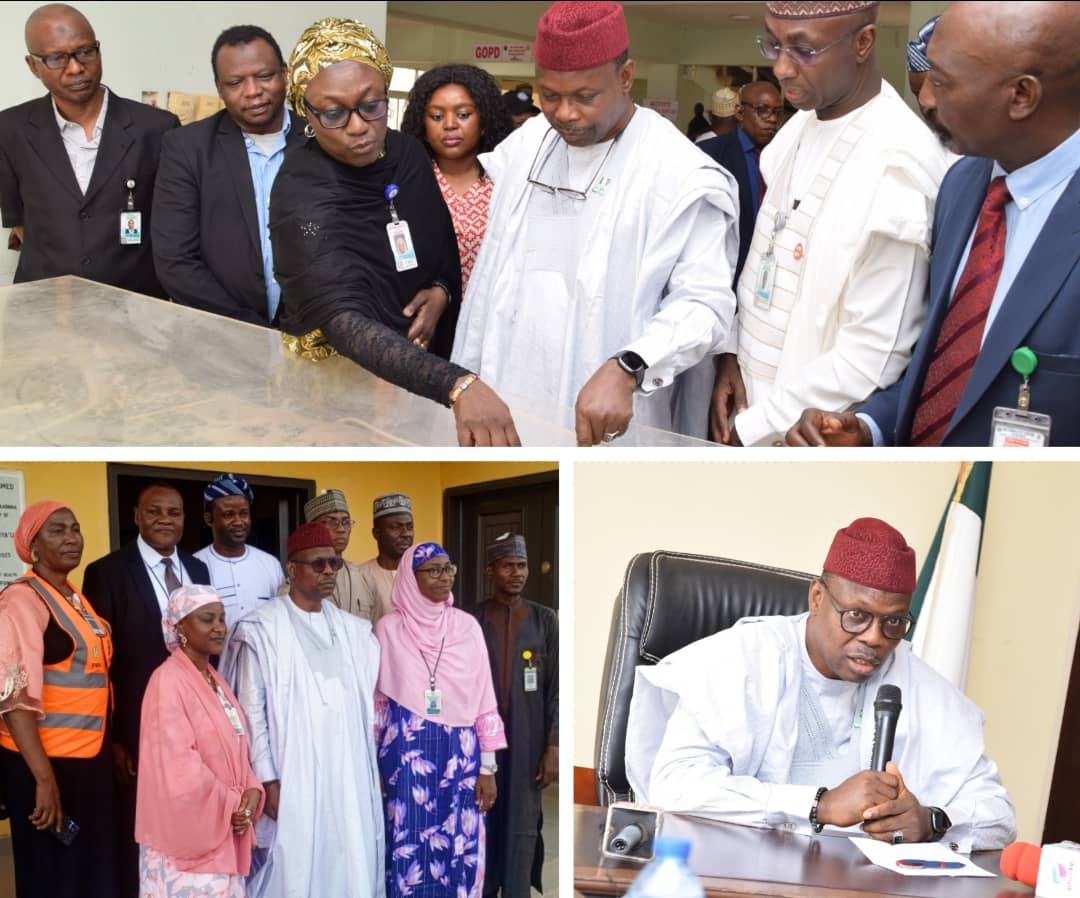Health
Health Minister visit Eye Centre, FNPH NECC in Kaduna, declares war against Medical Tourism

Nicholas Dekera, Kaduna
Nigeria’s Minister Health for States Dr. Iziaq Adekunle Salako yesterday visited the country apex Eye Hospital, the National Eye Centre Kaduna, Federal Neuro-Psychiatric Hospital and National Ear Care Centre all in Kaduna for a routine supervision of equipment and others.
Dr.Salako stated that President Bola Ahmed Tinubu has increased the budgetary allocation for health this year with a sole aim of eliminating medical tourism.
He said the budget targets reduce cost of controlled drugs and other medical consumables via issueing of waiver and a holistic change of mechanism in the recruitment process of Health workers to double the number of health workers presenting relocating abroad.The Health Minister maintained that ” the Federal Government Budgets for Eye Care surgery across Nigeria is hinged on what National Eye Centre Kaduna can do. It means this Hospital is strategic in the implementation of that aspect of the budget. The staff of this hospital must rededicate themselves to work and must also create VIP ( Very Important Personality) segments for all inclusive service thereby cutting off medical tourism.
While urging the Chief Medical Director Dr Amina Hassan-Wali to do a memo to the ministry for an out of court settlement with Kaduna state Government over the land dispute, the Health Minister charged the Hospital to develope and maintained a more robost community relations.
” I still feel this hospital is not doing enough because we still have a sizable number of Nigerians with preventable blindness, cataract and so many others. I want you to increase your penetration to the communities” Salako stressed.
Earlier, the Chief Medical Director of National Eye Centre Kaduna Dr. Amina Hassan-Wali in her welcome speech revealed that the hospital made far-reaching positive contributions in Eye Care in Nigeria especially in prevention of blindness stressing that the Centre aside Hospital Based Ophthalmic services, is committed to Community outreach.
” We have developed sub-specialties in Intra Ocular lens, implant microsurgery, pediatric ophthalmology, orbit/oculoplastic, retina and community ophthalmology, human resources development for Resident Training in Ophthalmology, restraining of opthalmologists from other Teaching Hospitals and Federal Medical Centers in recent ophthalmological surgical advances Ophthalmic Nursing Diploma Course, Advanced Diploma in Community Ophthalmic Nursing, instrument maintenance and Nurse Refractionist courses among others.” Dr Hassan Wali stated
Federal Neuro-Psychiatric Hospital
The Honorable Minister of State for Health Dr. I. A Salako was received at the Federal Neuro-Psychiatric Hospital by the Medical Director Dr Aishatu Armiyau at 02:10 Pm and proceeded on tour to facilities.
Dr. Salako who cited the National Mental Health Act 2021 pinpointed that the establishment of Mental Health departments in all Tertiary Hospitals, decriminalization of attempt to suicide and establishment of Health Assessment Committees in all states are sacrosanct to the well-being of Nigerians as stipulated by the act and have been prioritized by President Bola Ahmed Tinubu.
Whille assuring of more resources at the Basic Health Care, he said more funding is being budgeted for mental health at the Primary Health Care level to ensure patients satisfaction comes at a subsidized rate.
Salako who lauded the Federal Neuro-Psychiatric Hospital for its organized and digitalized medical records system cum hotel equivalent reception noted that, in diversifying, the hospital must focus on it primary mandate which is mental health, warning that resources must be deployed 99.9% for mental health.
He said that the hospital must also explore the creation of VIP segment for treatment to control stigma and cut Medical Tourism stressing that mental challenges exist even within the rich.
Salako also charged the Hospital to liase with the Kaduna State Government on Mental Health Services to ensure effective service delivery at grassroots.
National Ear Care Centre
The Health Minister challenged the Medical Director Dr. Mustapha Abubakar Yaro saying nothing much have been heard about National Ear Care despite the huge budget allocation which is almost equivalent to the Eye Centre and other National Hospitals.
” This year you must up your game, you can copy what Federal Medical Centre Ebute Meta is doing, this year we will ensure purchase of more equipments for this hospital and we will continue to support the hospital for effective service delivery. On the space you mentioned earlier, this place can not be abandoned because it is in the city centre but could still be managed for effective services. ” The Minister added
He said team work is needed for private sector investment to address power sector here because the resources spent on power as it is now can cater for private investment with a more effective result.
Salako called on the Medical Director to forward his request for recruitment waiver so that the numerous sensitive gaps created as a result of brain drain “Japa” could be filled up for better service delivery.
Over the years, National Ear Care Centre Kaduna had break throughs in cochlear implants surgery, laser head and neck surgery, middle ear surgery, voice restoration surgeries and endoscopic sinus surgery.
Health
World Human Rights Day: NGO Takes Medical Outreach to Okaka Correctional Center

From Mike Tayese, Yenagoa
The 8th edition of Prof. Seiyefa Brisibe Outreach has celebrated the 2025 World Human Rights Day with the inmates of the Medium Security Custodian Correctional Center Okaka in Yenagoa, the Bayelsa state capital as a way of showing care to them.
For the past seven years, the Outreach has been taken to different Bayelsa towns and villages delivering free medical care to the people of those communities and their surrounding areas.
The medical outreach was carried out by Family Care Hospital in collaboration with Prof. Seiyefa Outreach which is a Non-Governmental Organization of Prof. Seiyefa Brisibe in partnership with NigerianBar Association Yenagoa branch and International Federation of Women Lawyers (FIDA) to delivered medical outreach to the inmates to mark the occasion of World Human Rights Day 2025
Speaking with journalists during the event, Dr.
Woyengidoubara Terah Angaye a Medical Doctor and one of those that carried out the medical outreach at the Nigerian Correctional Center Okaka said, they were in the Correctional Center to give medical treatment to inmates as a way of given back to the society.According to him, they decided to take this edition to the Correctional Center in Okaka to mark the Human Rights Day 2025. “Prof. Seiyefa has actually touched a lot of lives because when we go out on these Outreaches, people get treated, consumables are given to the facilities, medicine given to the clinic, eye tests are done among others”.
On this particular occasion, we even went with an X-ray machine, those that were suspected of pulmonary TB were diagnosed on the spot and x-ray was carried out on their chest, other screening investigations were done as well, including retroviral and malaria and other screening were done.
“It was a very wide reach, a lot of people were touched and a lot of cases were treated. There were about 16 medical cases that were presented to the medical team and we were able to take care of all of them.
“Referrals were made for those that require referral and like every other one, at the end of the outreach all the medicines and other consumables that were carried by the team were donated to the Correctional Center to their clinic for further use.
“A total of 200 inmates were attended to by the team and spoke with the nurse in charge that there would be follow-up on some of the cases and for those who have positive results from their TB we have a follow-up for those persons.
“The inmates who were the primary beneficiaries of this outreach were very happy, it’s been a while according to some of them who spoke with us to have such care from outside and that it’s an opportunity to be treated by full medical team, doctors, nurses, medical laboratory scientist were all there to give them an adequate care and they were really happy to have that attention from private individuals and the Nigerian Bar Association coming together to deliver this.
“A lot of them were really thankful to the organizer of the medical outreach and I must say that it was a fulfilling day for most of them”, he said.
Also speaking, the chairman of Bayelsa state Nigerian Bar Association (NBA) Mr. Clement Bibisa Kekemeke Esq said they were in the Correctional Center in commemoration of World Human Rights Day 2025, saying it is in partnership with NBA Yenagoa branch, family care hospital and FIDA. “We have come to Sensitise inmates here in this correctional center that being an inmate here is not the end of the World, that it doesn’t mean that they will be subjected to indignity.
They have their fundamental rights as other people can. Today is special because we are doing what we have not been doing regularly. The partnership is important because the mental health, physical health of all the inmates is also important. Family Care is the major sponsor of the event”.
On her part, the chairperson of FIDA bayelsa state branch Dr. Boma Miebai Esq, said they in the Correctional Center to sensitise them on their rights as members of humanity and that their rights are still preserved under the law and their rights should be protected under the law. We are here to spotlight their rights within the facility and to throw light around issues of access to social justice.
Speaking during the event, ASC 1 David Odoki, the Welfare Officer in charge of the Medium Custodian Correctional Center Okaka Yenagoa Bayelsa state said, he feels very happy because the items they have brought will help to alleviate the plights of the inmates. “The food items they brought will be shared with them. For the medical aspect of it, sometimes we do have so many that are sick here and the facilities we have cannot at the same time take care of everyone, but this medical outreach has added value to our facilities”.
Health
Women, Girls Still Struggle to Access Healthcare in Nigeria – Findings

By David Torough, Abuja
As Nigeria marks Universal Health Coverage (UHC) Day 2025, new findings suggest that adolescent girls and young women continue to face serious barriers in accessing basic health services, despite years of policy commitments aimed at expanding coverage.
The assessment, released by the Gem Hub Initiative, points to rising out-of-pocket costs, weak primary healthcare capacity and limited youth-focused services as key obstacles preventing young people—particularly females—from obtaining timely and confidential care.
Nigeria has pledged to achieve universal health coverage, ensuring that all citizens can access essential services without financial hardship.
However, the report says progress remains uneven, with adolescents among the least served groups within the health system.According to Gem Hub, many young women are unable to afford services such as testing and treatment for sexually transmitted infections, especially those not enrolled in health insurance schemes. The financial burden often leads to delays or avoidance of care altogether, increasing health risks.
The findings are based on a rapid assessment of youth-friendly health services and a perception survey conducted in Rivers State, which the organisation said reflects challenges seen in other parts of the country. The review found that several primary health facilities lacked key sexual and reproductive health commodities, including emergency contraception, while shortages of trained staff and inconsistent application of youth-friendly service guidelines were also reported.
Infrastructure challenges were another recurring concern. Poor road networks, seasonal flooding, irregular clinic hours and unreliable electricity were cited as factors limiting physical access to care, particularly in rural and hard-to-reach communities. The report also notes low levels of community and parental engagement, which can discourage adolescents—many of whom depend on family members for health decisions—from seeking services.
A frontline health worker interviewed during the assessment said many young women were reluctant to return to facilities where they felt judged or lacked privacy. “When adolescents feel exposed or uncomfortable, they simply stop coming,” the provider said.
Universal Health Coverage Day is observed globally to highlight the importance of affordable and accessible healthcare. This year’s theme focuses on the burden of health costs, a challenge that remains acute in Nigeria, where out-of-pocket spending continues to account for a large share of healthcare financing.
Gem Hub Initiative says its findings underline the gap between national health policies and the lived experiences of young people, particularly girls and young women, whose health needs are often overlooked within the broader system.
The organisation works with adolescents and young adults across Nigeria on health, education and empowerment programmes, with a focus on generating evidence to inform public debate and policy.
Health
World Bank, Partners Record Progress Toward 1.5bn Healthcare Goal

The World Bank Group, global partners and countries on Saturday announced continued progress toward the goal of delivering affordable and quality health services to 1.5 billion people by 2030.
A statement by the World Bank Online Media Briefing Centre said 15 countries introduced National Health Compacts, outlining practical five-year reforms aimed to expand primary healthcare, improve affordability and support job-rich economic growth.
The statement said that since the goal was set in April 2024, the Bank and partners had supported countries to provide quality and affordable care to 375 million people.
It said work was underway with roughly 45 countries to scale proven primary care approaches that strengthen health outcomes while generating employment across health workforces, local supply chains and supporting industries.
“This progress comes as governments confront aging populations, rising chronic disease, and financial pressures.”
The statement said the 2025 Global Monitoring Report released at the Tokyo Universal Health Coverage (UHC) High-Level Forum showed that 4.6 billion people globally still lacked access to essential health services.
It said the report also revealed that 2.1 billion people faced financial hardship due to health expenses.
“These challenges underscored the need for long-term, coordinated reforms that help countries build more resilient and equitable health systems.”
World Bank Group President, Ajay Banga, is quoted in the statement as saying, “strong primary healthcare systems are central to both health protection and economic growth.
“Strong primary health systems do more than safeguard health, they support jobs and economic opportunity.
“Countries are stepping forward with clear priorities, and we are working alongside them to deliver practical solutions at scale.”
According to the statement, the 15 countries that introduced National Health Compacts at the forum in Tokyo are Bangladesh, Egypt, Ethiopia, Fiji, Indonesia, Mexico, Morocco, Nigeria, Philippines, Sierra Leone, Syria, Tajikistan, Uganda, Uzbekistan and Zambia.
The statement said the compacts, which were endorsed at the highest levels of government, outlined five-year, country-led reforms aimed at expanding the reach and quality of primary healthcare, improving financial protection and strengthening health workforces.
“They also align Health and Finance Ministries behind measurable targets, provide a roadmap for coordinated action and guide support from development partners across country-led priorities.”
It said key commitments by countries include mobilising new financing, growing and digitally enabling their health workforce, modernising health facilities, expanding insurance coverage, and digitising service delivery.
“For example, in terms of boosting regional manufacturing of health products and technologies, Nigeria will train 10,000 pharmaceutical and biotech professionals and establish Centres of Excellence.
“Nigeria will also provide tax incentives to expand local production of vaccines, medicines, diagnostic and health technologies, strengthen regulatory agencies through digital systems and global alignment.”
It said that to help countries advance their compacts and broader reforms, the World Bank Group, Gavi and the Global Fund announced aligned financing, including two billion dollars in co-financing with each institution.
The statement added that philanthropic partners working through the Global Financing Facility and the Health Systems Transformation and Resilience Fund aim to mobilise up to 410 million dollars for critical health areas.
It said Seed Global Health was working with compact countries to build capacity and provide support for assessment, planning and policy development, with a focus on advanced health workforce development.
The statement said Japan, the United Kingdom and other partners were also providing technical assistance.
“Japan, WHO and the World Bank jointly launched a Universal Health Coverage Knowledge Hub to support countries with practical evidence-based solutions and peer learning.”
It said the UHC High-Level Forum, co-hosted by the Japanese Government, the WHO, and the World Bank Group, brought together ministers of health and finance, business leaders, philanthropies, global health agencies and civil society.




















